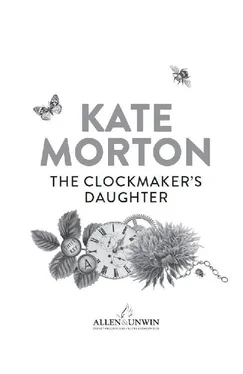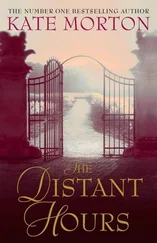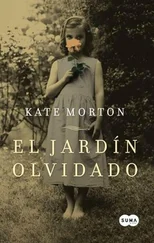Kate Morton - The Clockmaker's Daughter
Здесь есть возможность читать онлайн «Kate Morton - The Clockmaker's Daughter» весь текст электронной книги совершенно бесплатно (целиком полную версию без сокращений). В некоторых случаях можно слушать аудио, скачать через торрент в формате fb2 и присутствует краткое содержание. Год выпуска: 2018, Издательство: Allen & Unwin, Жанр: Старинная литература, на английском языке. Описание произведения, (предисловие) а так же отзывы посетителей доступны на портале библиотеки ЛибКат.
- Название:The Clockmaker's Daughter
- Автор:
- Издательство:Allen & Unwin
- Жанр:
- Год:2018
- ISBN:нет данных
- Рейтинг книги:4 / 5. Голосов: 1
-
Избранное:Добавить в избранное
- Отзывы:
-
Ваша оценка:
- 80
- 1
- 2
- 3
- 4
- 5
The Clockmaker's Daughter: краткое содержание, описание и аннотация
Предлагаем к чтению аннотацию, описание, краткое содержание или предисловие (зависит от того, что написал сам автор книги «The Clockmaker's Daughter»). Если вы не нашли необходимую информацию о книге — напишите в комментариях, мы постараемся отыскать её.
The Clockmaker's Daughter — читать онлайн бесплатно полную книгу (весь текст) целиком
Ниже представлен текст книги, разбитый по страницам. Система сохранения места последней прочитанной страницы, позволяет с удобством читать онлайн бесплатно книгу «The Clockmaker's Daughter», без необходимости каждый раз заново искать на чём Вы остановились. Поставьте закладку, и сможете в любой момент перейти на страницу, на которой закончили чтение.
Интервал:
Закладка:
For the many thousandth time, Elodie wished that her own mother were still alive to create some balance in the force. She had it on good authority – and not just from her father – that Lauren Adler had been extraordinary. Elodie had gone on a research binge when she was seventeen, the internet first and then beyond that by applying for a Reader Pass at the British Library, collecting every article and interview that she could find relating to Lauren Adler’s glittering career. In her bedroom at night, she’d read all of the articles, forming a picture of an exuberant young woman with a stunning talent, a virtuoso whose mastery of her instrument was complete. But it was the interviews that Elodie had savoured, for there, between the inverted commas, she’d discovered her mother’s own words. Her thoughts, her voice, her very turns of phrase.
Elodie had read a book once, found beneath the bed in a hotel room in Greece, about a dying woman who wrote her children a series of letters about life and how to live it in order that she might continue to guide them from beyond the grave. But Elodie’s mother had had no warning as to her impending death and had thus left no such sage advice for her only daughter. The interviews, though, were the next best thing and seventeen-year-old Elodie had studied each one, learning them by heart and whispering certain choice phrases to the oval mirror above her dressing table. They had become like revered lines of poetry, her very own list of life commandments. Because, unlike Elodie, who’d been struggling with bad skin and a hopeless case of teenage insecurity, seventeen-year-old Lauren Adler had been radiant: as modest as she was talented, she’d already played solo at the Proms, cementing herself forever as the nation’s musical sweetheart.
Even Penelope, whose self-confidence was as old and established as the string of perfect pearls around her neck, spoke of Elodie’s mother in tones of nervous awe. She never referred to ‘your mother’; it was always ‘Lauren Adler’: ‘Did Lauren Adler have a favourite concert piece?’ ‘Was there a venue that Lauren Adler preferred above all others?’ Such questions Elodie answered to the best of her ability. She did not mention that much of her own knowledge had been acquired from interviews that were freely available if one knew where to look. Penelope’s interest was flattering and Elodie clung to it. In the face of Alastair’s grand estate, his tweed-and-twill parents, the weight of tradition in a family whose walls were covered with ancestral portraits, Elodie needed every advantage she could claim.
Alastair had mentioned in the early days of their relationship that his mother was a classical music buff. She used to play herself when she was a girl, but had given it all up when she became a debutante. He’d told stories that endeared him to Elodie, of the concerts his mother had taken him to when he was a boy, the excitement of the London Symphony Orchestra opening night at the Barbican or the conductor’s arrival on stage at the Royal Albert Hall. It had always been just the two of them, their special time. (‘My father finds it all a bit over the top, I’m afraid. His favourite cultural activity is rugby.’) They still had a long-standing ‘date night’ each month, a concert followed by dinner.
Pippa had arched her brows when she heard that, particularly when Elodie admitted that she hadn’t ever been invited to join them, but Elodie had brushed it off. She was sure she’d read somewhere that men who treated their mothers well made the best partners. Besides, it was nice for a change for people not to assume that she must be a classical music aficionado. Throughout her life she’d had the same conversation over and over: strangers asking what instrument she played, the look of confusion when she told them that she didn’t. ‘Not even a little?’
Alastair had understood, though. ‘I don’t blame you,’ he’d said, ‘no point competing with perfection.’ And although Pippa had bridled when she heard this (‘You’re perfect at being you’), Elodie had known that wasn’t what he’d meant – that he wasn’t being critical.
It had been Penelope’s idea to include a film recording of Lauren Adler in the wedding ceremony. When Elodie said that her father kept a full video set of Lauren Adler’s performances and that she could ask him to pull them out of storage if Penelope wished, the older woman had looked at her with what could only be described as genuine fondness. She’d reached out to touch Elodie’s hand, the first time she’d ever done so, and said, ‘I saw her play once. She was stunning, so focused. A technician of the highest order, but with that added quality that made her music soar above all others. It was terrible when it happened, just terrible. I was bereft.’
Elodie had been taken by surprise. Alastair’s family did not ‘reach out’ and they did not broach subjects like loss and bereavement in casual conversation. Sure enough, the moment was over as quickly as it had come, Penelope moving on to general musing about the early arrival of spring and its implications for the Chelsea Flower Show. Elodie, less adept in quicksilver changes of subject, had been left with a lingering sensation on her hand where the other woman’s touch had been, and the memory of her mother’s death had shadowed her for the rest of the weekend.
Lauren Adler had been the passenger in a car driven by the visiting American violinist, the two of them making their way back to London after a performance in Bath. The rest of the orchestra had returned the day before, straight after the show, but Elodie’s mother had stayed behind to take part in a workshop with local musicians. ‘She was very generous,’ Elodie’s father had said many times, practised lines that formed part of the adoring litany of the bereaved. ‘People didn’t expect it from her, someone so impressive, but she loved music and she went out of her way to spend time with other people who loved it, too. It didn’t matter to her if they were expert or amateur.’
The coroner’s report, accessed by Elodie from the local archives during her summer of research, said that the accident had been caused by a combination of loose gravel on the country lane and poor judgement. Elodie had wondered why they hadn’t been on the motorway, but coroners didn’t offer speculation as to travel arrangements. Thus: the driver had taken a hairpin bend too quickly and the car had lost traction, skidding across the verge; the impact had thrown Lauren Adler through the windscreen, breaking her body in countless places. She would never have played the cello again had she survived, a fact that Elodie had learned from a couple of her mother’s musician friends whose conversation she’d overheard from her hiding place behind the sofa at the wake. The implication seemed to be that death was the lesser of two ills.
Elodie had not seen it that way, and neither had her father, who’d made it through the immediate aftermath, the funeral, in the grip of a shock-induced composure that was more alarming for Elodie in some ways than his plunge into the grey depths of despair afterwards. He had thought he was concealing his grief by remaining behind the closed door of his bedroom, but the old brick walls were not as thick as all that. Mrs Smith from next door had smiled with grim knowing as she stepped into the breach, serving up soft-boiled eggs and toast for dinner each night and telling Elodie vivid stories about London in the war: her girlhood nights spent amidst the bombs and the Blitz, and the day the black-rimmed telegram came with news of her missing father.
Thus, the death of her mother was something Elodie could never quite untangle in her memory from the sound of explosives and the smell of brimstone and, on some deep sensory level, the fierce longing of a child in need of a story.
Читать дальшеИнтервал:
Закладка:
Похожие книги на «The Clockmaker's Daughter»
Представляем Вашему вниманию похожие книги на «The Clockmaker's Daughter» списком для выбора. Мы отобрали схожую по названию и смыслу литературу в надежде предоставить читателям больше вариантов отыскать новые, интересные, ещё непрочитанные произведения.
Обсуждение, отзывы о книге «The Clockmaker's Daughter» и просто собственные мнения читателей. Оставьте ваши комментарии, напишите, что Вы думаете о произведении, его смысле или главных героях. Укажите что конкретно понравилось, а что нет, и почему Вы так считаете.












